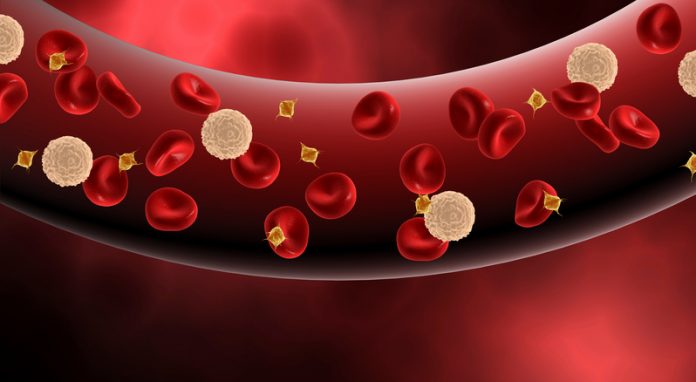
It is well known that so-called “hyperactive” blood platelets can result in abnormal blood clotting and an increased risk of heart attack, stroke, and peripheral artery disease. But measuring the clumping tendency—called aggregometry—to develop accurate patient risk assessments is not currently possible due to broad variations in lab testing methods.
Now, however, new research from a team at the NYU Grossman School of Medicine studying patients with platelet hyperactivity has precisely identified a set of 451 genes whose activity varied significantly in those with hyperactive platelets versus people without it. Using this information, the investigators created a scoring system that assigned weight to each genetic difference to generate a Platelet Reactivity ExpreSsion Score (PRESS), for each patient.
“Our results demonstrate that our new platelet-centric scoring system can, for the first time and across populations, circumvent aggregometry to reliably predict platelet hyperreactivity and the related risk of cardiovascular events,” said corresponding author Jeffrey Berger, MD, director of the Center for the Prevention of Cardiovascular Disease at the NYU Grossman School of Medicine.
Further, the researchers showed in their study, published today in Nature Communications, that their scoring system can identify platelet hyperactivity both in patients at immediate risk of heart attack, as well as healthy patients at future risk that would have remained unknown without PRESS.
“Physicians currently prescribe aspirin, a medication that counters platelet activity, to patients based on available risk factors, including high cholesterol or high blood pressure, which are not directly related to platelet function,” Berger said. “PRESS promises to help physicians confine anti-platelet treatment to the people most likely to benefit: those with platelet hyperreactivity.”
Using this system, the investigators say they can help physicians make more informed decisions about whether the benefit of prescribing aspirin to prevent clotting outweighs the resulting increased risk of bleeding.
For their research, the Grossman investigators, used a newer method of aggregometry that more weakly encourages aggregations than previous techniques to track the impact of platelet activity status on MACLE (major adverse cardiovascular and limb events.) MACLE is a composite measure of death, heart attack, stroke and lower extremity amputations in patients enrolled in the Platelet Activity and Cardiovascular Events in PAD (PACE-PAD) clinical study.
Patients selected have their MACLE measured after they underwent a set of procedures that opened blocked arteries called lower extremity revascularization (LER). Of the 254 patients studied, 17.5% were deemed to have hyperactive platelets and this group had more than two times the incidence of heart attack, stroke, or acute limb ischemia or major amputation within 30 days after LER than those without platelet hyperactivity. While the research relied heavily on aggregometry, the goal of the researchers was to instead find a method of determining platelet hyperactivity based on a genetic signature independent of variables that affect aggregometry.
For this portion of the study, the team gathered platelet genetic material from 129 patients before their LER procedure to design a scoring system based on the genetic variations associated with platelet hyperactivity. The team then confirmed their scoring method by comparing it against aggregometry. Further validation was conducted on patients not enrolled in PACE-PAD.
One such group of patients were women enrolled in the Heart Attack Research Program for patients undergoing coronary angiography. Data here showed that PRESS was higher in those who had previously suffered a heart attack than those with stable coronary artery disease. Patients with lower extremity atherosclerosis who were followed for 18 months who had a PRESS score above average were found to be 90% more likely to have a major cardiovascular event than those with a below average score.
“In current practice, anti-platelet therapy is not routinely recommended for the prevention of a first heart attack or stroke, but a platelet-based test would help to identify patients at highest risk, and those who would benefit most from anti-platelet therapy to prevent a cardiovascular event,” said author Tessa Barrett, PhD, assistant professor in the departments of medicine and pathology at NYU Langone. “Our score has the potential to further personalize cardiovascular disease risk prevention.”





